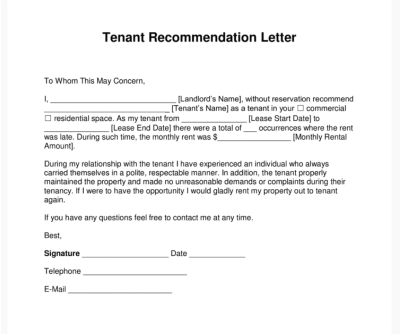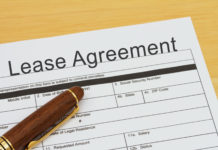Did you know Americans move 11.4 times on average in their lifetime? That’s a lot of new landlords and new tenants all the time, which is why landlords often request landlord reference letters from prospective tenants.
Landlord Reference Letter in Word
If you’re a new landlord or landlord who’s been asked to write one for the first time, don’t panic. Writing a professional reference letter doesn’t have to be complicated or hard. There’s no need to break out the dictionary and the 100-page tenant’s guideline rulebook.
All you’ll need is to try to remember the tenant you’re writing for, this article, a pen and paper, and a good cup of tea. And by the end of this, you’re going to know exactly what you need to include in a landlord recommendation letter, how to write it, and how to make it look professional.
What Is a Landlord Reference Letter?
The purpose of a landlord reference letter is simply this: to let the tenant’s future landlord know how they were as tenants in the property you managed and to verify the fact that they did, indeed, live in the address for the length of time they say they did.
This letter will help the landlord receiving it make an informed decision about the tenant. Some landlords require this as a part of their tenant screening process. Some simply want extra information on their prospective tenants to help make their final decisions about their applications.
Good Tenants vs Bad Tenants
Another important thing to keep in mind when tenants come to you for a recommendation letter is that you don’t have to say yes. If you’re short on time or you need to think about it, just be honest and let them know.
If you have time and they were great tenants, then you’re probably happy to oblige. But what if they weren’t? What if they were always late on rent? What if they left the apartment in a mess when they moved out?
As the landlord, you have every right to decline a tenant’s request for a reference letter. However, if you do choose to write the letter anyway, be honest and let the tenant know what you think. Then, you can let them decide whether they still want it or not.
And if you truly have nothing nice to say? In our professional opinion, it’s better to say no than to stir up unnecessary trouble. Apologize, let your tenants know you don’t think you’re the best candidate to write this letter, and wish them well.
Three Rules to Write a Professional Landlord Recommendation Letter
If you’re still reading this, we’re assuming you’ve got a good tenant or at least a decent one in hand. Great.
But before you begin writing, here are a few important rules to keep in mind as you write the letter. They’ll help you write a focused, clear, and professional letter.
Rule #1 – Keep it Factual
The most important thing to remember when you write this letter is that you’re going to describe your tenants as a tenant. Not what you thought of them as a person, a neighbor, or even a friend.
Why is this important? Because even the most unfriendly tenant can still be a good tenant. They might’ve never said hello to you in the hallway, but did they always pay their rent on time and respect all the rules? If so, they were a good tenant despite their personality.
This is an important distinction to make because sometimes landlords get their tenants’ personalities and their tenant-qualities mixed up. But remember this is an official letter about how the person was as a tenant, not anything else.
Rule #2 – Omit Personal Information
Since you’re a landlord, you’re probably familiar with The Fair Housing Act. But in case you forgot, let us remind you it’s a law that “prohibits discrimination in the buying, selling, renting or financing of housing.”
What does this have to do with your tenant reference letter? It means everything you write on there can be used against you. To protect yourself, avoid mentioning anything regarding the following:
- Race
- Nationality
- Gender
- Religion
- Age
- Job
- Marital status (unless they’re also under the lease)
- Disability status
- Military status
The mentioning any of the factors above is not only unprofessional, but it can get you in trouble. The best way to prevent this is to read your letter one more time when you’re done and check to see that the letter is free of all of the above points. If it isn’t, make sure you change the sentences or take them out.
3. Be Honest
If you were writing about a perfect tenant, this wouldn’t be hard at all. But what if you had to write about a good tenant with a few problems (like they always needed to be reminded to pay rent)? Should you disclose them? We think so because it’s the ethical thing to do.
If you have trouble deciding whether to share something or not in the letter, ask yourself this: if you were the landlord whose about to receive this letter, would you want to know this information? If so, then you should probably mention it.
A just and reasonable landlord should be able to make the decision themselves about the tenants.
Things You Must Include in a Tenant Reference Letter
Now that you know the most important rules of writing a tenant reference letter, let’s get to the things you must include, from top to bottom.
1. Names, Date, and Addresses
At the very top of the letter should be your name, your address, and the date you’re writing the letter. Underneath that, you should write the current address and name(s) of the tenant you’re writing the letter for.
2. Who You’re Writing the Letter for
Before starting the letter, get the name of the person you’re writing to from the tenants. It’s important you have this, otherwise, the tenants can give the letter to anyone they want.
3. Duration of Tenants’ Lease and Occupation Time
In your first paragraph, start by verifying the length of time the tenants lived at the mentioned address. If they left before their lease, make sure you mention when, whether they paid any necessary fees, and if they notified you ahead of time.
4. Rent
In your second paragraph, talk about when the tenants handed in their last rent payment, whether they always paid on time, and if not, how many times they paid late and when.
5. Condition of Property When They Left
When the tenants left, did they leave the property in the same condition that you handed it to them? If so, write that. If not, what was different about it? If there were any property damages caused by the tenant? Make sure you note them and whether they paid for them or not.
6. General Tenant Behaviors
Without going into too many details about the tenants (see “Rule #2 – Keep Personal Information Out of It”), how were they as tenants?
What were their day-to-day interactions like with other tenants? Did they respect their neighbors and the property? Were there any complaints filed against them? If so, what were they about?
7. Pets
If your tenants had pets, make sure to mention this. A lot of landlords are concerned about this, and they’ll want to know if their pets were well behaved or not.
8. Any Issues that Occurred During Occupancy
Were there any other issues that came up during the tenants’ occupancy that are worth mentioning? Did they break any other rental agreement terms? If so, write them down and explain whether the tenants were cooperative in rectifying the situation.
9. Your Overall Recommendation
Finally, before you end the letter, write a short statement about whether you would recommend the tenants or not. Keep it short, simple, and direct.
10. Letter Closing
At the very bottom of the letter, write your name, your title, and a phone number or email address where the other landlord can reach you.
What Would You Want to Know?
Remember, the person you’re writing to is a landlord just like you. This means the issues that concern you as a landlord would also concern them. If you ever find yourself stuck, simply ask yourself this: what would you like to know about a new tenant before they move in?
At the end of the day, this landlord just wants a better idea of who’s moving into their property, and your landlord reference letter will help them paint a better picture. They might’ve already made up their mind about the tenant or they know nothing. Either way, your letter is going to help them and your previous tenants a lot.





















